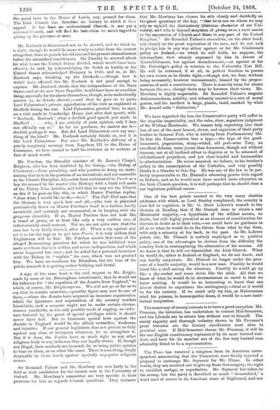Mr. Roebuck is determined not to be elected, and we
think he is right, though be would do more wisely to retire from the contest altogether, than to parade his old sins and his present shamelessness before his astonished constituents. On Tuesday he avowed afresh his wish to see the United States divided, which would have been effected, he said, by acknowledging the South as hastily as the United States acknowledged Hungary in 1849, and so, as Mr. Roebuck says, breaking up the blockade ;—though how it would have effected this Mr. Roebuck is not good enough to explain. Mr..Roebuck thinks that the independence of the Slave States and of the new Slave Republic would have been an excellent thing, especially for the slaves themselves, though, as he undoubtedly assures us, he detests slavery;—and then he goes on to quote Lord Palinerston's private approbation of his view as explained at Sheffield during the war. Lord Palmerston greeted him, he says, on a visit made to Cambridge House just after that speech, with " Roebuck, Roebuck ! what a devilish good speech you made in Sheffield . . . . why, I am entirely of your opinion, only I dare not officially say so." As for its goodness, we cannot see it— devilish perhaps it was. But did Lord Palmerston ever say any- thing of the kind ? Mr. Roebuck certainly thinks so, and it is like Lord Palmerston. But since Mr. Roebuck's delivery of a purely imaginary message from Napoleon III. to the House of Commons, we have ceased to hold his evidence as to matters of fact of much worth.


































 Previous page
Previous page